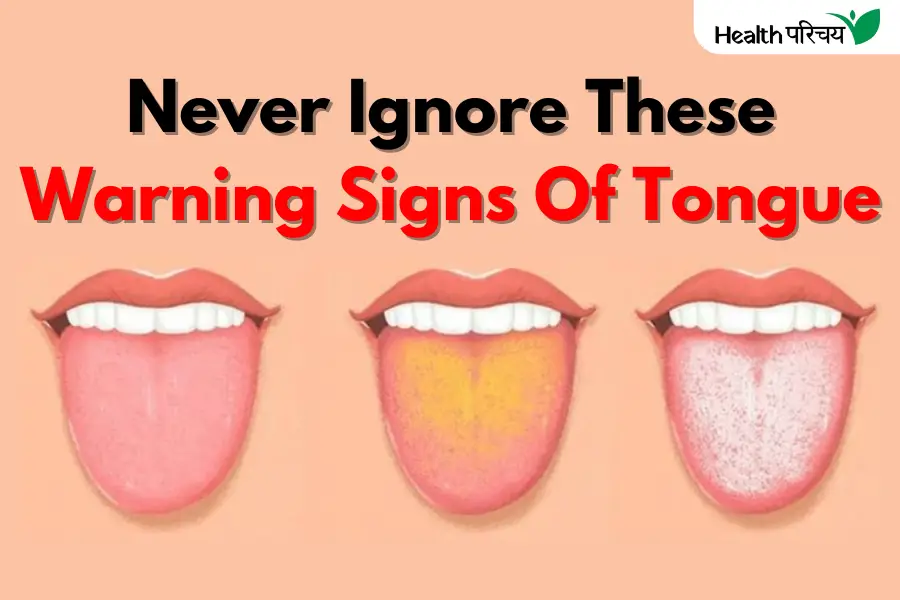Tongue Warning Signs: Our body has its own ways of signaling when something is wrong, and the tongue plays a vital role in this. Beyond helping us taste food, your tongue can reveal a lot about your overall health. Ignoring unusual changes in your tongue can lead to severe health issues in the future.
Here are 7 key signs your tongue may be showing that you should never ignore—and why paying attention to them matters.
1. White Coating on the Tongue
A white layer on your tongue may indicate an infection or digestive issues. This is often caused by:
- Oral Thrush (Candida Infection): A fungal infection due to overuse of antibiotics or a weakened immune system.
- Poor Oral Hygiene: Bacteria and debris accumulation can cause the white coating.
- Dehydration: Not drinking enough water can lead to a white film on the tongue.
Tip: Maintain good oral hygiene, stay hydrated, and include probiotics in your diet to improve gut health.
2. Excessively Red or Bright Pink Tongue
A tongue that appears unusually red or bright pink can signal:
- Vitamin Deficiencies: Lack of Vitamin B12 or Folic Acid.
- Allergic Reactions: Certain foods or medications can cause this discoloration.
- Scarlet Fever or Infections: A “strawberry tongue” is often associated with bacterial infections.
Ignoring this could lead to conditions like anemia or worsen underlying infections. Consult a doctor to identify and address the cause.
3. Recurring Sores or Ulcers on the Tongue
Sores or painful ulcers that appear repeatedly can be due to:
- Nutritional Deficiencies: Deficiency of iron, zinc, or Vitamin B.
- Stress or Acidic Foods: Excess stress and spicy foods can trigger mouth ulcers.
- Oral Cancer: Persistent, non-healing ulcers may be an early sign of oral cancer.
Warning: If the sores don’t heal within two weeks, seek immediate medical attention.
4. Swollen Tongue
A swollen tongue, often appearing larger than usual, can signal:
- Thyroid Disorders: An underactive thyroid (hypothyroidism) may cause swelling.
- Allergic Reactions: Food allergies or medications can trigger tongue swelling.
- Infections: Bacterial or viral infections can result in inflammation.
If swelling persists or interferes with breathing, consult a healthcare professional immediately.
5. Dark Patches or Black Spots on the Tongue
Dark spots or black patches on the tongue may be caused by:
- Hormonal Imbalance: Conditions like Addison’s disease may cause pigmentation.
- Smoking and Alcohol: Excessive use can stain the tongue and harm oral health.
- “Black Hairy Tongue”: Caused by bacterial overgrowth, leading to discoloration and bad breath.
Action: Reduce tobacco and alcohol intake, improve oral hygiene, and visit a dentist for persistent spots.
6. Yellow Tongue
A yellowish tongue is often a sign of:
- Liver Problems: Conditions like jaundice or liver dysfunction can cause tongue discoloration.
- Poor Digestion: Stomach issues, indigestion, or acid reflux may result in a yellow tongue.
- Bacterial Overgrowth: Plaque buildup and lack of oral hygiene can also cause this.
Solution: Improve digestion by eating lighter meals, stay hydrated, and consult a doctor for liver-related concerns.
7. Cracks or Fissures on the Tongue
A cracked or fissured tongue can result from:
- Dehydration: Not drinking enough water can cause the tongue to dry and crack.
- Vitamin Deficiencies: Lack of Vitamin B12 and other nutrients can worsen the condition.
- Autoimmune Disorders: Conditions like Sjögren’s Syndrome may cause fissures.
While harmless in many cases, a cracked tongue can harbor bacteria, leading to infections. Maintain hydration and a balanced diet to prevent further damage.
Also Read: 5 Weirdly Effective Ways to Boost Your Immunity
Conclusion
Your tongue is a reflection of your overall health, and ignoring its signs can lead to severe health consequences. If you notice any of these 7 changes, take them seriously and consult a doctor for timely diagnosis and treatment. Your tongue might just be trying to save your health!







Leave a Reply